 Frank Gibeau, president of the EA Games label at Electronic Arts, is responsible for taking the battle to EA’s arch rival, Activision Blizzard, in a big way this fall with the coming launch of Battlefield 3. That’s a heavy burden, since Activision Blizzard has the world’s most popular modern combat shooting game franchise — which generates more than $1 billion a year in revenues — and it is preparing to launch Call of Duty Modern Warfare 3 on Nov. 8. Last week, EA announced that it was launching Battlefield 3 on Oct. 25 and that the game will have its own social network.
Frank Gibeau, president of the EA Games label at Electronic Arts, is responsible for taking the battle to EA’s arch rival, Activision Blizzard, in a big way this fall with the coming launch of Battlefield 3. That’s a heavy burden, since Activision Blizzard has the world’s most popular modern combat shooting game franchise — which generates more than $1 billion a year in revenues — and it is preparing to launch Call of Duty Modern Warfare 3 on Nov. 8. Last week, EA announced that it was launching Battlefield 3 on Oct. 25 and that the game will have its own social network.
Gibeau has been running the EA Games Label at EA since 2007. He has held various executive positions since joining the company in 1991. We caught up with Gibeau last week at E3. Here’s an edited transcript of the interview.
VentureBeat: How was the reaction to the coming out of Battlefield 3 at E3, and how do you look at the competition?
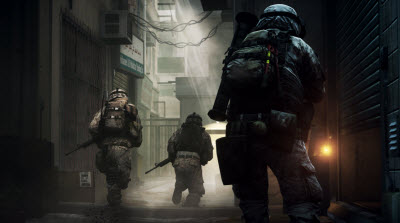 Frank Gibeau: You know, the response has been overwhelmingly positive. It certainly has exceeded our expectations. We are very proud and pleased with the product but, man, people love it. I get a pleasure reading forum posts on this fight and seeing how people are responding to it.
Frank Gibeau: You know, the response has been overwhelmingly positive. It certainly has exceeded our expectations. We are very proud and pleased with the product but, man, people love it. I get a pleasure reading forum posts on this fight and seeing how people are responding to it.
This competition is good for the industry. It’s good for the overall category for shooters. I believe is going to bring a lot of attention. It gives customers a choice in a category and it’s giving people a lot of innovation. It’s also a situation where it’s not like you can only root for one of two football teams in the Super Bowl. These are very differentiated experiences, so I think fans and players can potentially play both and compare and contrast them this holiday. We are going all out. We are going to leave nothing to chance. We love competing as a company. We have a history of these fights with FIFA, PES and EA Sports. So you know it’s a heavyweight fight. We are the underdog, but you know that we are going for it.
VB: Is there a way to classify the difference in some way? Need for Speed The Run seemed to me like an over-the-top game, right? And so Call of Duty has always seemed like an over-the-top combat drama, with helicopters smashing into each other?
FG: With Call of Duty you can see the entire Russian navy showing up with more warships than they have in reality.
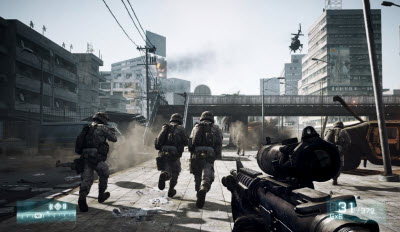 VB: Yes. Whereas Battlefield has seemed more realistic right? It shows what you would actually experience in a real war.
VB: Yes. Whereas Battlefield has seemed more realistic right? It shows what you would actually experience in a real war.
FG: One way to think about it is just like Roger Moore’s James Bond versus Jason Bourne in the spy realm. You can have spectacular, killer, exciting visceral moments. Battlefield has that. But where Battlefield has always come from is its authenticity at depicting big battles. And the technology that we have — the Frostbite 2 engine [a graphics engine for the Battlefield games] — allows us to do a lot of things differently like that tank level. You can drive the tank anywhere on the map. It’s a huge open place and it’s not just a rail shooter where you can only go in one direction. You can drive the tank left. You can drive the tank back. You can have a full tank battle that way. We have environmental lighting, lots of really cool weapons effects, and it looks unbelievable. You have that fidelity, that authenticity of feeling like you are in the Paris Metro and there are soldiers approaching you with flash lights on their guns. We really believe that visceral realistic feeling is what sets us apart from them.
Destruction is another big deal. We haven’t really shown off the full extent of destruction yet, but you can take whole houses down, drive a tank through them. When you place them in the competition’s titles, you will be shooting and you run behind a paper billboard and you will put holes in the paper billboard and the bullets won’t go through the paper billboard. Battlefield allows you to knock the whole billboard over. You may knock down a wall, knock down a door so it opens up different ways of playing the game.
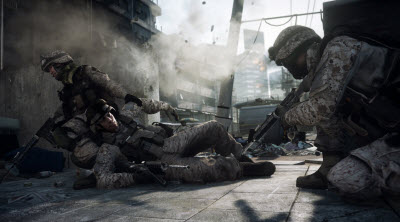 So destruction, scale, vehicles, Frostbite 2. I think just on a game play level we have something very different from what the competition has.
So destruction, scale, vehicles, Frostbite 2. I think just on a game play level we have something very different from what the competition has.
If you play the multiplayer, they are very different in terms of team tactics. You can mix and match a guy flying overhead with a helicopter, getting shot at by a tank while somebody else drives a Humvee into the side of the tank with explosives. Or there is a sniper in the building knocking somebody else down with an artillery strike. That literally all happens in one level as opposed to the competitor’s battle where you have ten guys on each side in a small confined space shooting at each other without a lot of those features. So I can go on and on, but yes those are the things we think about.
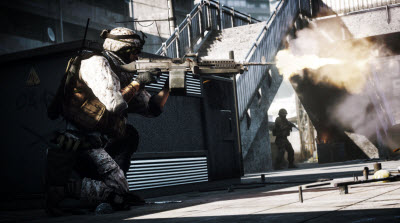 VB: Now the realistic graphics you showed are based on PC technology?
VB: Now the realistic graphics you showed are based on PC technology?
FG: The demos at E3 were based on the PC, although a lot of the footage that we showed on the walls and things is a mix of Xbox 360, PS 3 and PC. We see a big opportunity on the PC for Battlefield because it’s an audience that really hasn’t been getting dedicated support and focus. We saw a really good opportunity to put out a PC experience on multiplayer that we have with the Paris level.
VB: Is there like wider spread on the graphics quality, with the Xbox 360 at the low-end and the PC racing ahead pretty far?
FG: No, I don’t think so. If you look at Need for Speed The Run, that is running on Frostbite 2. Battlefield Bad Company 2 on the 360 and the PC and the PS 3 all looked pretty good. That was from DICE (the developer of the Battlefield games) so we are not worried about a big gap between the two. In fact, we have it running on the consoles and are pretty pleased with it. On the PC, there will be interesting things we can do with certain types of graphics cards and things that I think the PC audience in particular really respond to.
VB: Can you talk about some of the decisions you made with Battlefield 3, like launching it a couple of weeks earlier than Call of Duty Modern Warfare 3, and why you are doing a social network as well?
FG: I always take a first-to-market advantage. I like to get the game in people’s hands first. It’s a multiplayer game, so you will get online, start building up your character and that will give us a chance to feel the network effect. We have the beta testing coming up in September so people can really try it early. We can get them engaged with Battlefield 3 early.
On the online standpoint, you know we don’t think you should charge for talking to your friends. I mean its one of those things where social mechanics and social dynamics drive player engagement. That leads to monetization, downloadable content and a great game play in big communities. So you know we’ve made a conscious decision that we’d rather people were engaged in telemetry and friending and social so that it creates more player engagement. That creates bigger communities that then allows us to have the largest base possible to serve.
VB: Is there now a good reason to have a Battlefield-focused social network and then the broader EA Origin social network?
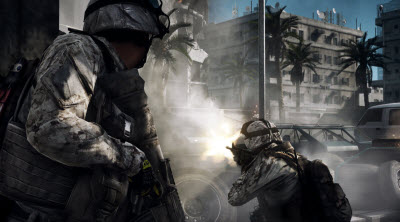 FG: Well, they are built on the same tech, so you can have a Nucleus [a cross-platform EA game community] account whether you are coming in for Mass Effect or Battlefield or Need for Speed. We are still going to be able to figure out how you are doing, what you are doing, and serve you better.
FG: Well, they are built on the same tech, so you can have a Nucleus [a cross-platform EA game community] account whether you are coming in for Mass Effect or Battlefield or Need for Speed. We are still going to be able to figure out how you are doing, what you are doing, and serve you better.
So Battlelog (the social network for Battlefield 3) is definitely a next-generation application of Autolog from Need For Speed Hot Pursuit last year. We are also building social experiences in our free-to-play games like Battlefield Heroes and those types of products. So social is a primary design pillar for us and is part of every design that we put in a console now and also our PC games. The way we talk to you in Origin, we talk to you in Battlefield — it’s just like you might have HBO with a fan base that likes Game of Thrones or The Sopranos. We are still all HBO fans. We might have some different tastes and a little bit more local affinity and relevance on those things. But overall it helps the company and it’s common in a lot of key areas.
VB: You think the social layer will help you sell more games?
FG: Yes, absolutely.
VB: It’s like a discovery tool?
FG: Yes. If I can post something about what I was doing in a game and tell my friends that, they will take notice. It helps facilitate the spreading of that game. Word of mouth plus the network effect is driven by social.
VB: So that’s as important an area of innovation as, say, game play and graphics?
FG: We believe so. Like I said, we think it’s a primary design pillar.
VB: What is the frequency with which you will do these first-person shooters? Will you keep them as separate brands and try to do them every year?
 FG: We don’t really know. We obviously did Medal of Honor last year. We are doing Battlefield 3 this year. We haven’t announced what we are going to do next, but you know we’ve got a technology based on Frostbite 2 that’s pretty bad ass and we are going to use that going forward as the basis for all our shooters we’ve developed internally.
FG: We don’t really know. We obviously did Medal of Honor last year. We are doing Battlefield 3 this year. We haven’t announced what we are going to do next, but you know we’ve got a technology based on Frostbite 2 that’s pretty bad ass and we are going to use that going forward as the basis for all our shooters we’ve developed internally.
And then how we zig or zag depending on the intellectual property will vary. But what’s of paramount concern for me is that we don’t get into and over-annualize it, burning out our teams with sequelitis. We’ve got to have alternating teams that can leverage the best technology and the best assets, but keep it fresh. We are designing with different teams on the Need for Speed property. That is a good example of how we are tweaking it. Last year, Criterion did Hot Pursuit, and this year Black Box is doing the run. Those are different developers creating different experiences. They will be familiar and enjoyable. They both have Autolog, they both have really cool cars and drive really fast, they have high-tech. But we are to tell a different narrative story. Shooters will probably follow the same path.
VB: And what has been the difference between the Battlefield property and the Medal of Honor property? Is there still a difference considering they are in the same era now?
FG: Yes, it’s true. Medal of Honor is much more about the story of a soldier, a single soldier going through an experience, and comradeship of the squad. You don’t really jump around to different characters in a jet or a tank. It’s much more of a story-driven single soldier narrative. Battlefield has always been big army: tanks, jets that sort of thing. It’s got Special Operations moments, but its primary focus is about telling that experience of a big huge battle. Medal of Honor is a little bit more realistic in its story orientation as you saw from last year’s game. In Battlefield, we are fighting in real world places but it’s very different.
VB: Is Battlefield Bad Company more like the comic shooter category?
FG: We’ve moved on from that.
VB: The reason I ask is that Ubisoft’s Brothers in Arms: Furious Four game is a comic World War II shooter.
FG: Oh yes. Those characters are still with us, but you know with Battlefield 3, we decided to tell a different story. In the future, if it makes sense, we may bring back those four guys from Bad Company.
VB: So it seems like we are still nowhere near the fatigue that gamers had with World War II. That killed the World War II shooter category and made everyone move on to modern combat.
FG: It doesn’t feel that way. I mean look at the interest and what’s going on right now I don’t think we are near that at all.
VB: We dwelled on Battlefield 3. But what else did you want to communicate?
FG: Over the last couple of years, we were really focused on getting to fewer games with bigger efforts and higher quality. We have deep online experiences. I think our lineup this year is proof of that — with Battlefield 3, which we just talked about, then Need for Speed The Run is another good example. Mass Effect 3 is really going deep on the story-driven action. It is adding a lot of innovation. That’s going to be an epic product, and of course Star Wars: The Old Republic represents a big online bet for us.
But it’s not the only story in terms of our releases. That little-known component of our business that is growing dramatically is the free-to-play business. Games like Need for Speed World have actually accumulated and brought in millions of customers that were never in the Need for Speed universe. And so what we have really oriented our company around now is intellectual property universes or game worlds that manifest themselves across console, free-to-play games, social network games like Facebook, mobile tablet and so on. So the idea is that now you create a world that is interoperable across those platforms. They are different experiences based on the type of platform or based on server site persistence of Nucleus.
When you look at Need for Speed on the console, last year we sold millions of units on Xbox 360 and PS 3. We also had five million players come into the free-to-play game, and those five million players came in from places like Brazil, Russia, Ukraine, Poland — places where we weren’t monetizing Need for Speed and in fact they were just pirated there. But with the free-to-play play experience and the Nucleus registration, we now have 15 to 25 million customers as opposed to ten million on the consoles. They are profitable and they are monetized and they are part of a larger audience for Need for Speed now. And we are thinking about customer acquisition and audience numbers not necessarily in units anymore. We are thinking about lifetime value of the Need For Speed player versus how much it costs to get them, as opposed to what [market researcher] NPD said this week about unit sales on a particular platform.
VB: It seems like the game business now is harder business. You have to make decisions about whether to do a version of the game every year, every four years, or across many platforms. With Red Dead Redemption, RockStar took six years and maybe $120 million.
FG: The way I think about it for the EA Games label is we think about our core blockbuster IPs and then we figure out how to get them to the largest audience possible. It is complex. It is a fragmented market, but it’s also a huge opportunity for a company like ours where our IPs and production values are unlike anybody else’s. You know we compete with Activision or Zynga on a particular vector, but nobody is really pulling across all of the sectors in a really effective way. That’s what we are trying to do. I really like the complexity of the business that we are in right now because it points to an advantage that we have. We have a platform-agnostic approach to development, 25 years of brands, diversity of our brands — going from the Sims, to sports, to action to whatever. If we are smart and disciplined as a management team and really prioritize what’s important, we can create gigantic audiences and intellectual property universes. They can be built on platforms like the Origin online game and distribution service. That really is going to lead to the digital transformation. It finally feels like it all fits together.
In the past, it may have seemed disjointed. Now we have synergy, with one building on the other. Nucleus enables Origin, Origin and Nucleus enable an MMO environment. The MMO enables us to extend new IPs in new ways. We get experiments. We do business models like Battlefield 1943 [which was sold as a downloadable Xbox Live game]. They are all thoughtful brand extensions, and they are all bets against a meaningful long-term plan. That’s what’s exciting about the company really.
VB: Does Facebook look like it’s going to welcome the hardcore gamers in a big way? OnLive and Gaikai are making it possible to play hardcore games directly on Facebook. And there are companies like Kabam that are creating brand new hardcore games on Facebook. What chance do hardcore games have on Facebook, and what is the next-generation Facebook game? There is certainly a huge gaming audience there now.
FG: My view of Facebook is that we are in the early innings of it being a gaming platform. I think that it’s showing a lot of diversity and interest of what people want to play on Facebook. I think it’s going to evolve such that there will be a hardcore gaming market on Facebook. I also think that how it’s going to evolve is a little bit different. Every time you introduce a plug-in or download, you are dead. You really have to be able to play it inside the frame of Facebook. It needs to be an experience that is custom for Facebook. In the case of Dragon Age Legends, we took an IP from the console games and launched it on Facebook. We took an IP that people knew and created a very different experience than what people played with the PC game. It’s really building a strong audience and we are continuing to add features. So I do think role-playing games and strategy games that are more turn-based and can be played asynchronously are more appropriate for Facebook. There is some real-time, synchronized stuff like Battle Pirates from Kixeye. Those are interesting. Facebook is an interesting game platform, [but] I don’t think it will be particularly dominant.
There is a vast oversupply of Facebook games coming, and when you are in that situation, the brands and intellectual properties are going to stand out.
VB: For the Wii U, I think the good thing is that you will be able to render one game on four different systems: the Wii U, the PC, the Xbox 360 and the PS 3.
FG: Right. It’s not standard definition anymore and it’s high-definition. It’s a lot more in our strike zone for where we create our games.
 We’ll be exploring the most disruptive game technologies and business models at our third annual GamesBeat 2011 conference, on July 12-13 at the Palace Hotel in San Francisco. It will focus on the disruptive trends in the mobile games market. GamesBeat is co-located with our MobileBeat 2011 conference this year. To register, click on this link. Sponsors can message us at sponsors@venturebeat.com. To pitch a startup at the Who’s Got Game contest at GamesBeat 2011, click here.
We’ll be exploring the most disruptive game technologies and business models at our third annual GamesBeat 2011 conference, on July 12-13 at the Palace Hotel in San Francisco. It will focus on the disruptive trends in the mobile games market. GamesBeat is co-located with our MobileBeat 2011 conference this year. To register, click on this link. Sponsors can message us at sponsors@venturebeat.com. To pitch a startup at the Who’s Got Game contest at GamesBeat 2011, click here.
VentureBeat's mission is to be a digital town square for technical decision-makers to gain knowledge about transformative enterprise technology and transact. Learn More

